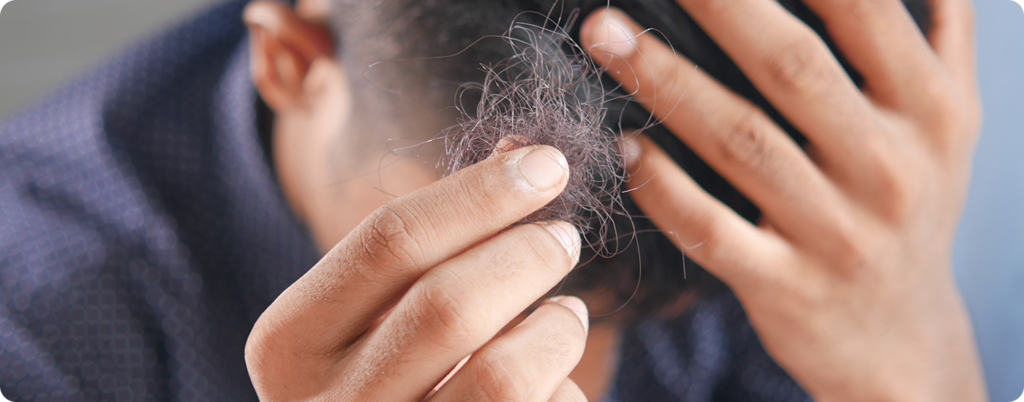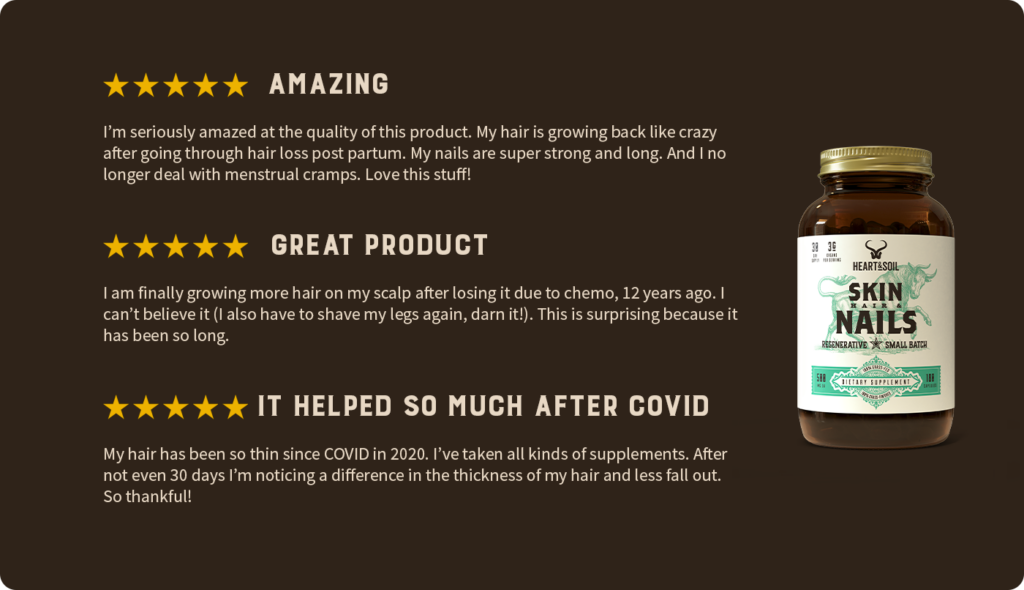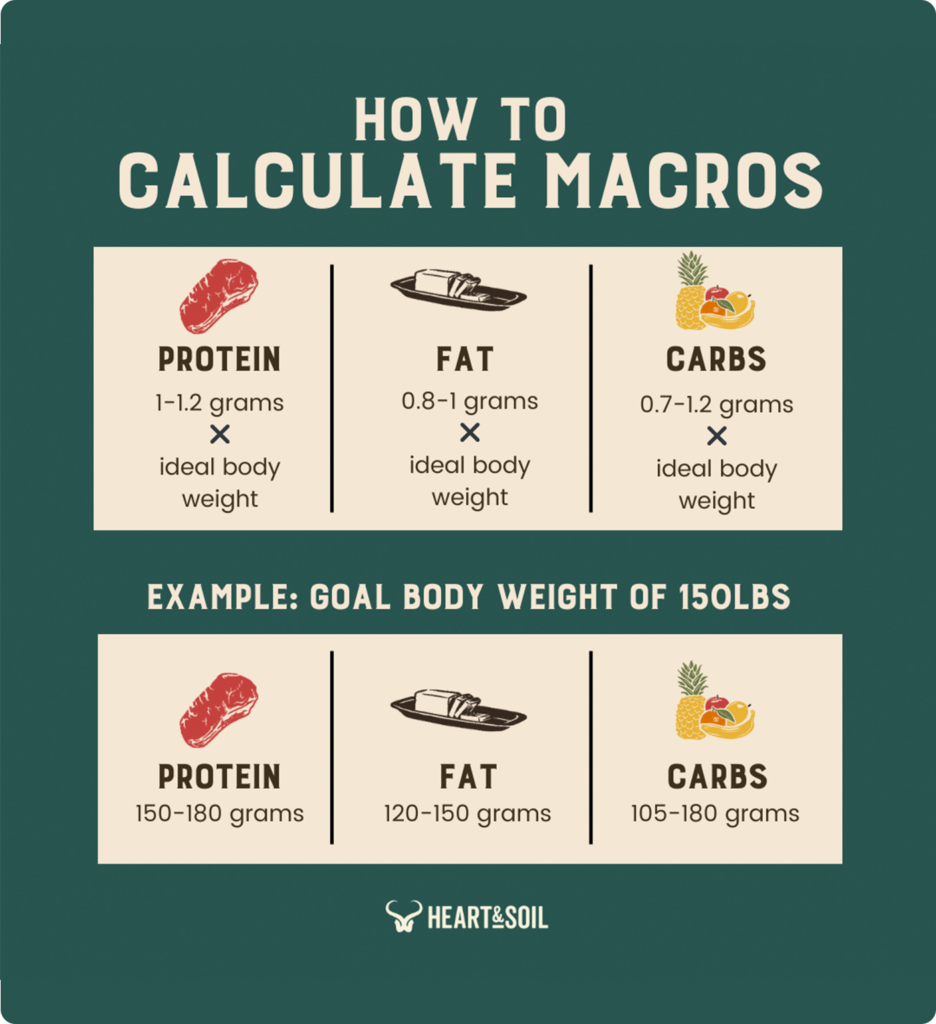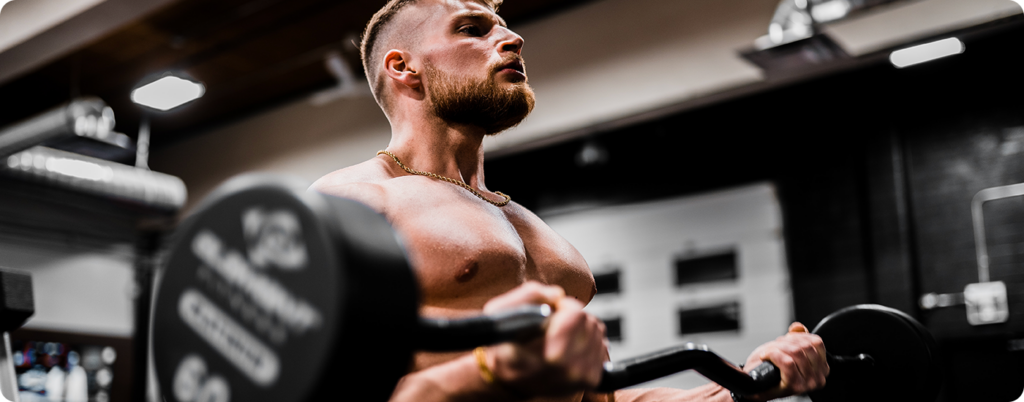MEDICAL DISCLAIMER: The information in this blog is for educational purposes only. It is not a substitute for professional medical advice. Consult your healthcare provider if you’re seeking medical advice, diagnoses, or treatment.
Hair loss can be painful, embarrassing and make you feel hopeless.
Thankfully, as our understanding of hair loss has expanded there are many natural hair loss remedies you can try to slow or even reverse your hair loss.
In this article, we’ll cover the main types of hair loss and 10 practical and natural hair loss remedies you can use to support a healthy scalp.
The 3 Most Common Types of Hair Loss
Most hair loss falls into the following 3 categories, with the genetic condition affecting the vast majority of sufferers:
- Androgenetic Alopecia (male or female pattern baldness) affects 60-70% of adults worldwide and typically presents as progressive, symmetric hair loss. While it has a familial predisposition, hormone metabolism and androgen receptors can play critical roles in its progression (1, 2).
- Alopecia Areata typically presents as non-scarring patches of hair loss and is linked to autoimmune issues and thyroid irregularities (3).
- Telogen Effluvium typically presents as an even thinning of hair across the scalp, often reversible, and can result from stress, illness, pregnancy, malnutrition, and other causes. (4).
Medical treatments, ranging from topical creams and oral medications to surgical implantation, are available, and results vary widely.

Hair loss is often a function of multiple factors that trigger or accelerate the process. The most important step you can take is to understand the factors causing your specific hair loss condition. While there is a genetic component, hair loss is often a symptom resulting from thyroid challenges, autoimmune disease, childbirth, or certain medications (5).
For this, you may need to seek out the guidance of a medical professional. Check out the Society of Metabolic Health Practitioners, where you can find physicians from all around the globe who understand the immense value of making animal foods the center of the diet. Another popular option is IFM Find a Practitioner for a functional medicine approach.
How an Animal-Based Diet Can Improve Hair Loss
There is a growing body of anecdotal evidence that people who adopt an animal-based diet experience a change in the thickness, quality, and growth of their hair. We’ve received dozens of reviews (for Skin, Hair, & Nails in particular) from people who’ve seen improvements in hair loss or thinning following childbirth, COVID-19, or certain diets.
Here are a few of those reviews:

The animal-based diet has helped many people achieve a level of health that’s tough to experience on the conventional Western diet. This way of eating prioritizes nutrient-dense foods and the removal of processed foods. The potential benefits of animal-based eating include better digestion, metabolic function, cardiovascular health, hormone function, and more.

Your body is an incredible, complex biological network of systems that can heal and perform at very high levels with the proper nutrients and environment. Although we don’t believe that hair loss always signals poor health (it’s WAY more complex than that), it does stand to reason that better health for the entire body would contribute to hair regrowth and health.
10 Natural Diet & Lifestyle Tips to Support Hair Health
Your situation isn’t hopeless, even if you are genetically predisposed to hair loss. There is reason to believe that creating a healthy, ancestrally consistent lifestyle and diet can restore the biological mechanisms of hair growth and health.
Here are the ten foundational steps we suggest for people with hair loss:
1. Massage Your Scalp
Make a point to incorporate scalp massages into your grooming routine. They’re a proven, low-cost practice that stimulates blood flow, reduces stress, and encourages hair growth. In fact, in this podcast with hair loss expert Robert English, scalp massage is one of the practices shown to help stop hair loss and stimulate healthy hair growth.
There is evidence that micro-needle rollers (6) can help promote healing in the scalp and restore the integrity of your hair follicles.
2. Eliminate Seed Oils
Processed vegetable oils (corn, safflower, sunflower, soybean, cottonseed, canola, peanut, grapeseed, sesame, etc.) contain high levels of linoleic acid (omega-6 polyunsaturated fatty acid or “PUFA”). Linoleic acid from highly processed vegetable oils is associated with many problems like weight gain and chronic disease.
To counteract the superabundance of linoleic acid, we suggest replacing seed oils with tallow, ghee, butter, and other nourishing saturated fats.
This also means reading ingredient labels and avoiding most packaged foods. Industrial food production relies on seed oils because they’re cheap and abundant. When dining out, you can request the kitchen cook your food in butter or without vegetable oil.
Additionally, do your best to avoid fatty pork, chicken, duck, turkey, or other monogastric animals primarily fed corn and soy diets. Like humans, these animals will store excess linoleic acid in their fat cells, which is readily absorbed when we eat them.
3. Prioritize Well-Raised Meat & Organs
We suggest you focus on meat and organs from grass-fed ruminant animals such as cattle, buffalo, goat, lamb, and deer. Look for the liver and heart if you can find high-quality, fresh organ meat.
Simply put, these are the most nourishing foods on the planet. You can get nearly every vitamin and mineral you need.
If you consume poultry, eggs, or pork, stick with free-range or pasture-raised options. Industrial farms rely on cheap corn and soy-based feeds to raise and fatten their animals. Even “organically raised” animals may be fed organic corn and soy — resulting in a buildup of linoleic acid in their fat tissues.
We also suggest consuming bone broth made from bones and connective tissue. High-quality bone broth contains an important amino acid called glycine, which plays several roles in our physiology (7). It functions as a neurotransmitter in the brain and supports relaxation (8)!
If you want to add variety outside of beef, we suggest White Oak Pastures and Nose To Tail; they offer low-linoleic acid meats, such as pork, bison, lamb, and chicken. If you don’t have access to fresh organs, check out our Skin, Hair, & Nails Stack.
4. Adequately Nourish Your Body
Eating sufficient amounts of animal-based fat, meat, organs, raw dairy, fruit, and other carbohydrates helps your hormones, energy, mood, immunity, and digestion thrive. Hair requires energy to grow and vitamin or mineral (such as zinc and iron) deficiencies can cause hair loss (9). Inadequate intake may cause your body to prioritize other essential functions.
In addition to organs, consuming protein in the form of sustainably raised meat is essential. You also need sufficient fat and carbohydrates to achieve the best nutrition possible.
The following formulas will help you assess the correct macronutrient ratios for your needs.

Regarding your fat and carbohydrate intake, if your total activity level is on the lower end of the spectrum, you should experiment with the lower end of the range, but if you are more active, try the higher end of the range.
5. Prioritize Sleep & Recovery
Few things are as simple, cost-effective, and beneficial as quality sleep. During sleep, your body builds, repairs, and heals from the various stressors of life.
Simple diet and lifestyle decisions can dramatically improve your sleep quality. We suggest turning off devices with screens one to two hours before bed (10), dimming the lights, being consistent with your bedtime, and aiming for 7-9 hours of sleep.
6. Focus on Exercise & Movement
Good stress, such as exercise, triggers important processes and helps to regulate your hormones. Even the simple act of walking a few miles a day is beneficial.

Ideally, you should incorporate slow movement (like walking) with strength training and high-intensity movement like sprinting. A short walk after meals can help regulate blood sugar (11).
Like anything, excessive exercise can actually be an issue. Overtraining may result in conditions that lead to hair loss (12).
7. Sunbathe
Whatever you’ve heard about the dangers of sunlight, the reality is that our bodies use sunlight to produce vitamin D and nitric oxide (13), which also help regulate hormones, decrease blood pressure (14), and improve overall blood flow.
Go outside, play in the sun, and enjoy nature! Daily sun exposure can stimulate your natural circadian rhythm, promoting sleep (15), recovery, and muscle growth. It may even improve the alpha diversity of the gut (16).
8. Incorporate Heat & Cold Exposure, & Red Light Therapy
Heat exposure can improve vascular health, blood flow and is known to be cardioprotective. It can also dramatically improve the immune system (17, 18, 19, 20).

The real magic for vascular health comes with the expansion of blood vessels, production of growth factors, and delivery of nutrients within the microcapillaries (small blood vessels) that feed important tissue.
Cold therapy provides additional benefits to help strengthen the immune system and improve vascular health. Start by spending time in a cold shower, or if you have access to a cold plunge, you can follow this protocol.
Some studies with cancer patients show that scalp cooling is one of the most promising approaches (in terms of efficacy and safety) to prevent alopecia associated with cancer treatments (21).
Red light therapy has been shown to stimulate hair follicles and can promote hair growth (22).
9. Manage Your Stress
Everyone experiences some level of stress on a daily or weekly basis. This is completely normal! To create an optimal healing environment, you must take the time to care for yourself.
We challenge everyone to engage in some stress management activity. Meditation, prayer, sitting outside and connecting with nature, learning a new skill, or getting away from electronics can all be enjoyable ways to reduce stress (23, 24, 25).
10. Choose Your Hair Products Wisely
Certain fragrance chemicals and preservatives in shampoos and other personal care products can cause irritation (26, 27). Even natural fragrances and botanical extracts are becoming more problematic as their use increases.
One way to lessen skin irritation is to keep things as simple and fragrance-free as possible. Pure coconut oil, olive oil, and argan oil have been shown to help reduce hair protein loss, fortify the scalp microbiome, and protect hair against oxidative damage (28, 29, 30).
EWG is an excellent resource for finding cleaner personal care products. Chem Trust also has helpful insight on this topic.
Don’t Lose Hope, Natural Hair Loss Remedies Can Actually Work
As our friend Mark Sisson says, “Genetics load the gun. Diet and lifestyle pull the trigger.”
A properly constructed diet and lifestyle can overcome a variety of challenges! We’ve worked with countless people who’ve improved their hair health by including nutrient-dense foods, reducing stress, prioritizing sleep, and cutting out processed foods.
Subscribe to future articles like this: